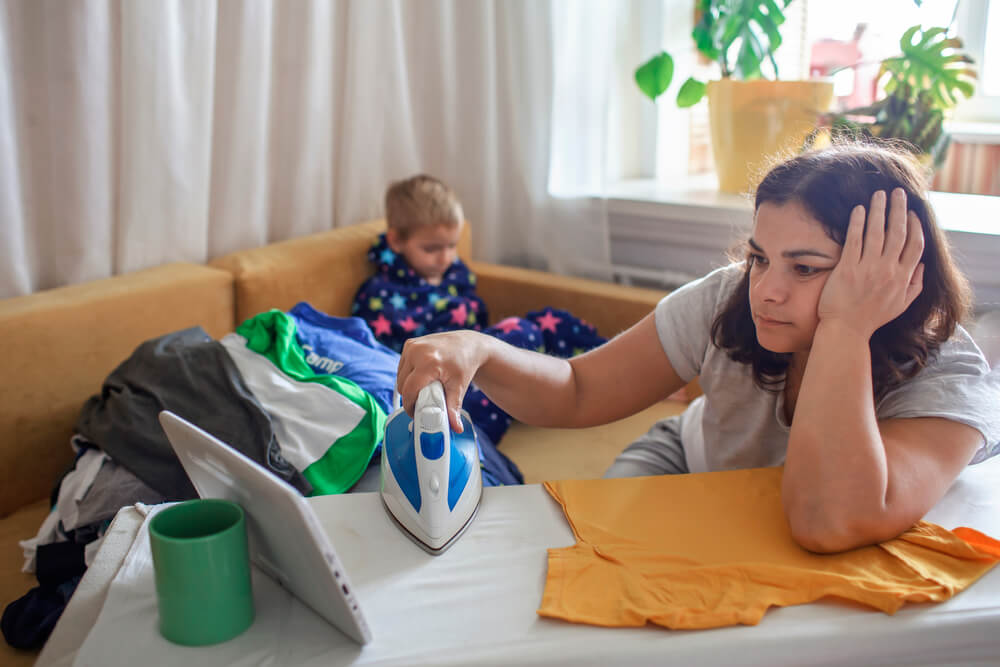Mom Burnout: What Is It and How to Handle It

Being a mom is hard work, and many moms feel the pressure at some point or another. In the worst case, a tired mom may even experience “mom burnout”, which is a serious condition with both physical and mental consequences.
Read on to learn all about mom burnout, including what it is, how it happens, and what you can do to manage it.
Contents:
- What Is Mom Burnout?
- Where Did the Term “Burnout” Come From?
- Signs and Symptoms of Mom Burnout
- What Causes Mom Burnout?
- What Can You Do To Cope With Parental Burnout?
- How To Avoid Burnout in the Future
- How the Findmykids App Can Help with Parental Burnout
- FAQs
What Is Mom Burnout?

Maria Symchych/Shutterstock.com
Mom burnout, otherwise known as maternal burnout, motherhood burnout, or just parental burnout, is a condition that affects moms all over the world.
It’s not officially listed in mental health handbooks just yet, but it’s widely-accepted and understood to be a real and serious condition, personified by feelings of mental, emotional, and physical exhaustion that come about due to being a mother.
Put in a simpler way, mom burnout is when moms just feel worn out by the very act of being a mom. It’s hard work, after all, with so many tasks, duties, and responsibilities.
When a little baby comes into your life, and you’re suddenly responsible for feeding them, changing them, keeping them safe, and so on, your life can feel like it’s flipped upside down, and nothing will be the same again.
It’s a massive shift for many people, and one that’s hard to adjust to. Even as kids get older, new responsibilities emerge for moms to handle, and it’s only natural that many feel worn down and worn out by the whole process.
Where Did the Term “Burnout” Come From?

Gorloff-KV/Shutterstock.com
We usually associate the term “burnout” with the world of work, and the term itself originated way back in the 1970s. In ‘74, to be precise, a psychologist named Herbert Freudenberger came up with the concept.
Freudenberger originally related the term to those in the healthcare field—doctors, nurses, etc.—who were left feeling completely exhausted and “burned out” by their work. But, over time, it came to be a universal term for people feeling exhausted by their jobs.
It’s an official term, too. The World Health Organization (WHO) recently added “burnout” to the International Classification of Diseases (ICD), defining it as “chronic workplace stress that has not been successfully managed.”
According to the WHO’s own definition, symptoms of burnout include feelings of exhaustion, mental separation from one’s job (or negative emotions towards the job), and reduced productivity, as a result of tiredness and lack of energy.
While burnout has historically been linked with work, it’s easy to see how this can cross over into being a parent. Being a parent is, in many ways, a full-time job. Moms have tons of pressure and so many responsibilities, and many experience major stress and anxiety.
Thus, the term “mom burnout” has been coined, with millions of moms understanding exactly how it feels.
Signs and Symptoms of Mom Burnout

Nicoleta Ionescu/Shutterstock.com
As with any health condition, mom burnout comes with certain symptoms that mothers should understand and be aware of, in order to spot when they (or someone they know) might be suffering from it.
The main signs include:
- Extreme Tiredness: Burned out moms tend to feel really tired and even struggle to get out of bed in the morning or carry out day to day activities.
- Emotional Exhaustion: As well as physical tiredness, burnout suffers can feel emotionally drained.
- Feeling Lonely and Isolated: Many moms report feeling completely alone and isolated, like nobody understands or connects with them.
- Emotional Separation from the Child(ren): It’s also common to start feeling distant to one’s children and lacking the connection you had before.
- Anger and Mood Swings: With burnout, it’s also possible for one’s emotions to spiral out of control. You may feel angry without warning or suffer random up and down mood swings.
- Lack of Patience: Many burned out moms also find that they lack patience and get annoyed or bothered very easily, even by relatively minor things.
- Low Productivity: When you’re feeling so tired and worn out, it’s only natural that you also become less productive as a result and don’t get as much done each day.
- Feeling Lack of a Bad Mother: Burned out moms also often feel guilty and believe themselves to be bad parents, as they feel unable to fulfill their motherly duties.
What Does Burnout Feel Like?

Natalia Deriabina/Shutterstock.com
Burnout can manifest in different ways for different moms, and it’s hard to truly capture in just a single, simple definition. Because of this, and because parenting is always a naturally difficult and tiring experience, many people aren’t sure if they’re suffering from burnout or just generally tired from their parenting role.
That’s why it’s important to note the emotional element of burnout. It’s not just “feeling tired,” it’s also about feeling emotionally worn-down, isolated, and distant from your children and those around you.
If you just feel tired from chasing the kids all day, that’s probably not burnout, but if you’re feeling emotionally drained as well, burnout might be the reason.
What Causes Mom Burnout?

fizkes/Shutterstock.com
There are lots of different factors that can cause or contribute to the development of mom burnout. These include:
- Lack of Support: Moms will naturally feel burned out if they’re the ones responsible for a large part of the parenting. If they have to do everything, from feeding the kids to driving them to school, and so on, without help from the other parent or family members, they can quickly slip into a burned out state.
- Stress: If you’ve already got a lot of stress in your life—due to things like finances, jobs, relationships, and so on—you’re more likely to also suffer from burnout. This is because stresses tend to accumulate, growing larger and heavier on a person’s mind and making everything they do—including parenting—much harder and more tiring.
- Trying to Be a Perfect Mom: A lot of moms (and dads, too) strive to be the best they can be. They want their kids to have the happiest and healthiest upbringing, and they want to be perfect parents. But they sometimes push too hard in that quest for perfection, and wear themselves out in the process.
- Mental Health Issues: Studies and surveys also suggest that those who have a history of mental health problems—like depression, stress, and anxiety—are more likely than others to end up suffering with burnout, too.
What Can You Do To Cope With Parental Burnout?

Kaspars Grinvalds/Shutterstock.com
Mom burnout (or parental burnout) isn’t something you can just fix overnight. It’s an emotional, mental condition that can wear you out and cause a lot of stress and negative effects. However, there are steps you can take to cope with this condition and gradually ease those effects, moving back towards a more positive and healthier state of being.
- Improve Your Support System: As stated, one of the big causes of burnout is when you don’t have enough help or support in your maternal tasks. So, one of the first things to work on is getting more help. Ask family and loved ones to pitch in more with day to day child care activities.
- Turn to the Pros: Mom burnout is a serious condition, just like PTSD or depression, and it may require the services of a mental health professional to resolve. Speaking with a psychologist or therapist could be a great way to get some things off your chest and start looking at life in a more positive, self-affirming way.
- Recognize Unrealistic Expectations: One major cause of burnout is setting unrealistic expectations for yourself. Understand that it’s okay not to be perfect. Accept that some days will be harder than others and adjust your expectations accordingly.
- Address the Pervasive Sense of Detachment: Burnout often comes with a pervasive sense of detachment from your children and daily activities. To counter this, engage in activities that rekindle your connection with your kids, such as playing games, reading together, or simply talking about their day.
- Combat Fatigue with Better Sleep: Fatigue is a significant factor in parental burnout. Prioritize getting enough sleep by establishing a regular bedtime routine, limiting screen time before bed, and creating a restful sleep environment.
- Prioritize Self-Care: Make self-care a regular part of your routine. Engage in activities that rejuvenate you, whether it’s exercising, reading, or pursuing a hobby. Taking care of yourself is crucial for maintaining your ability to care for others.
- Consider Alternative Parenting Methods: Sometimes, your parenting approach could be holding you back and forcing you towards a burned out state. Maybe you’re trying to teach your kid to use the potty, but it just isn’t working, or you’re trying to balance your working and home schedules in a way that’s putting too much pressure on you. Try doing things differently to see if the situation improves.
How To Avoid Burnout in the Future

BAZA Production/Shutterstock.com
With the methods above, it’s perfectly possible to overcome burnout. It might not happen overnight, but with time, you can get there. However, burnout is the kind of condition that can come back again and again, if you’re not careful or keep following the same patterns and behaviors that caused it the first time.
To avoid this, try to identify your triggers for burnout and find ways to avoid them. Adjust your parenting schedule and approach to be easier and less stressful for you, and give yourself freedom and time to indulge in the things you like.
Amidst the fatigue, try to find moments of joy in your daily routine. Whether it’s a hug from your child, a quiet cup of coffee, or a peaceful walk, these small joys can make a big difference in your overall well-being.
Sharing the load can also significantly reduce stress. Involve your partner or older children in household chores. This not only lightens your burden but also fosters a sense of teamwork and responsibility in the family.
Practice self-care and mindfulness to feel more at ease, and rely on friends, family, and even tech solutions—like parenting apps—to alleviate some of the pressure you feel as a mother.
How the Findmykids App Can Help with Parental Burnout
Parental burnout is a real and pervasive issue, often marked by feeling overwhelmed and exhausted by the daily demands of parenting. The Findmykids app can be a valuable tool in managing these stresses and reducing burnout. Here’s how:
- Real-Time Location Tracking: The app provides real-time location tracking of your child, which means you can always know where they are. This reduces the constant worry and anxiety about their safety, giving you peace of mind and allowing you to focus on other tasks without constant distraction.
- SOS Button: In case of an emergency, your child can press the SOS button, instantly alerting you and providing their exact location. This feature ensures that you can respond quickly to any issues, reducing the sense of helplessness and enhancing your feeling of control and security.
- Safe Zones: With the ability to set up designated safe zones, you receive notifications when your child enters or leaves these areas. This helps you ensure they are where they are supposed to be, without having to constantly check in, which can alleviate some of the mental load of parenting.
- Notifications: The app sends alerts about your child’s movements, the battery status of their device, and other important updates. Staying informed without having to continuously monitor your child manually reduces the feeling of being overwhelmed and allows for more focused and less fragmented attention to other tasks.
- Sound Around: The live-listening feature lets you hear what is happening around your child’s device. This can be particularly reassuring in uncertain situations, providing additional context and reducing anxiety about your child’s well-being.
By leveraging these features, the Findmykids app helps parents manage their responsibilities more efficiently and effectively, providing tools to ensure their child’s safety while reducing the unrealistic expectations they might place on themselves.
Take control of your child’s safety and reduce your stress with the Findmykids app. Download now to enjoy real-time tracking, emergency alerts, and peace of mind, knowing your child is safe. Don’t wait—get the Findmykids app today!
Summing Up: Dealing with Mom Burnout
All in all, it’s clear to see that maternal burnout isn’t just a new fad to take lightly. It’s a serious issue, with genuine potential for negative mental, physical, and emotional health effects. To avoid it, moms need to be proactive, seeking help and support where needed to cope with day-to-day tasks and ease the burden on their shoulders.
Unfortunately, even with a great support network and a careful approach, you can still suffer from mom burnout, without warning. That’s why it’s important to spread the word, letting other moms and dads know about this issue and how to handle it.
With that in mind, please share this guide around and help the other parents in your life get the knowledge they need.
FAQs

PeopleImages.com – Yuri A/Shutterstock.com
What are the signs of mom burnout?
Some of the most common signs and symptoms of maternal burnout include: feeling exhausted by the very act of being a parent, feeling like a bad or useless parent, feeling tired and worn-out on a regular or persistent basis, feeling fed up at the prospect of being a parent, and distancing yourself from your children.
How do you fix motherhood burnout?
Some good methods for dealing with mom burnout include asking for help from friends and family to ease your parental stress, using alternative approaches to parenting that might suit you and your child better, and seeking mental health support from trusted professionals, like therapists and counselors.
What is depleted mother syndrome?
Depleted mother syndrome is simply another term for mom burnout. It’s a condition that affects a lot of moms, whereby they feel worn-out, both physically and mentally, by the pressures and responsibilities brought on by becoming a mother. This can lead to feelings of stress, sadness, tiredness, and emotional distance from the rest of one’s family.
What is burnout for becoming a mother?
Burnout from becoming a mother is a common condition that a lot of new moms experience. Becoming a mom is such a big change, after all, bringing lots of new responsibilities and completely changing a woman’s life in so many ways. It can be hard to adjust to those changes and all the new duties on one’s shoulders.
The picture on the front page: Nicoleta Ionescu/Shutterstock.com
Проверьте электронный ящик




















